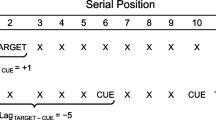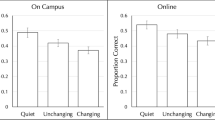Abstract
Three experiments were conducted to demonstrate the effects of motivational arousal, due to anticipated task difficulty, on retention of familiar and unfamiliar incidental materials. Brehm, Wright, Solomon, Silka, and Greenberg (1983) have provided evidence that motivational arousal in immediate anticipation of a task is a nonmonotonic function of task difficulty, with difficult tasks producing a relatively higher level of motivational arousal than easy or impossible tasks. It was predicted that increased motivational arousal would facilitate retention of incidentally presented familiar materials (presumably more easily retained) and interfere with retention of incidentally presented unfamiliar materials (presumably less easily retained). In Study 1, subjects anticipating either an easy or a difficult task were exposed to familiar and unfamiliar first names. The predicted interaction between task difficulty and familiarity on recall of the first names was reliably supported. In Study 2, an impossible task condition was added. The results indicated that an effective impossible condition had not been created. In a third study designed as a procedural modification of Study 2, the predicted nonmonotonic interaction was found. Theoretical implications are discussed.
Similar content being viewed by others
References
Atkinson, J. W., & Feather, N. T. (1966).A theory of achievement motivation. New York: Wiley.
Brehm, J. W., Wright, R. A., Solomon, S., Silka, L., & Greenberg, J. (1983). Perceived difficulty, energization, and the magnitude of goal valence.Journal of Experimental Social Psychology, 19 21–48.
Heckhausen, H. (1977). Achievement motivation and its constructs: A cognitive model.Motivation and Emotion, 1 283–329.
Hull, C. L. (1943).Principles of behavior. New York: Appleton-Century.
Kukla, A. (1972). Foundations of an attributional theory of performance.Psychological Review, 79 454–470.
Kukla, A. (1974). Performance as a function of resultant achievement motivation (perceived ability) and perceived difficulty.Journal of Research in Personality, 7 374–383.
Latta, R. M. (1976). Differential tests of two cognitive theories of performance: Weiner versus Kukla.Journal of Personality and Social Psychology, 34 295–304.
Pallak, M. S. (1970). Effects of expected shock and relevant or irrelevant dissonance on incidental retention.Journal of Personality and Social Psychology, 14 271–280.
Pallak, M. S., Brock, T. C., & Kiesler, C. A. (1967). Dissonance arousal and task performance in an incidental verbal learning paradigm.Journal of Personality and Social Psychology, 7 11–20.
Spence, J. T., & Spence, K. W. (1966). The motivational components of manifest anxiety: Drive and drive stimulation. In C. D. Spielberger, (Ed.),Anxiety and behavior. New York: Academic Press.
Spence, K. W. (1956).Behavior theory and conditioning. New Haven: Yale University Press.
Spielberger, C. D., Goodstein, C. D., & Dahlstrom, W. G. (1958). Complex incidental learning as a function of anxiety and task difficulty.Journal of Experimental Psychology, 56 58–61.
Van Bergen, A. (1968).Task interruption. Amsterdam: North-Holland.
Wright, R. A. (1982). Perceived motivational arousal as a mediator of the magnitude of goal valence.Motivation and Emotion, 6 161–180.
Wright, R. A. (1984). Motivation, anxiety and the difficulty of avoidant control.Journal of Personality and Social Psychology, 46 1376–1381.
Yerkes, R. M., & Dodson, J. D. (1908). The relationship of strength of stimulus to rapidity of habit formation.Journal of Comparative Neurology and Psychology, 18 459–482.
Zeigarnik, B. (1927). Das Behalten erledigter und unerledigter Handlungen.Psychologische Forschung, 9 1–85.
Author information
Authors and Affiliations
Additional information
These experiments were ably conducted by Ralph Young, whose help is gratefuly acknowledged. We would like to express our gratitude to Jack Brehm for invaluable suggestions concerning this research.
Rights and permissions
About this article
Cite this article
Hill, T., Fultz, J. & Biner, P.M. Incidental learning as a function of anticipated task difficulty. Motiv Emot 9, 71–85 (1985). https://doi.org/10.1007/BF00991551
Issue Date:
DOI: https://doi.org/10.1007/BF00991551




